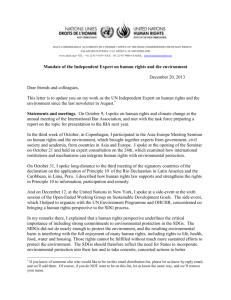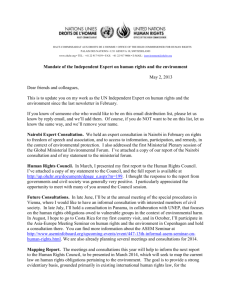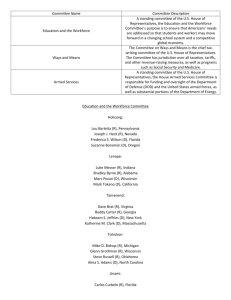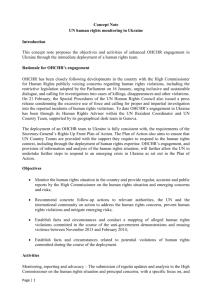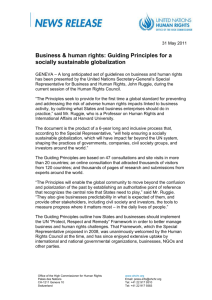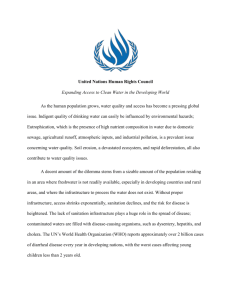Promotion and protection of human rights in Iraq
advertisement
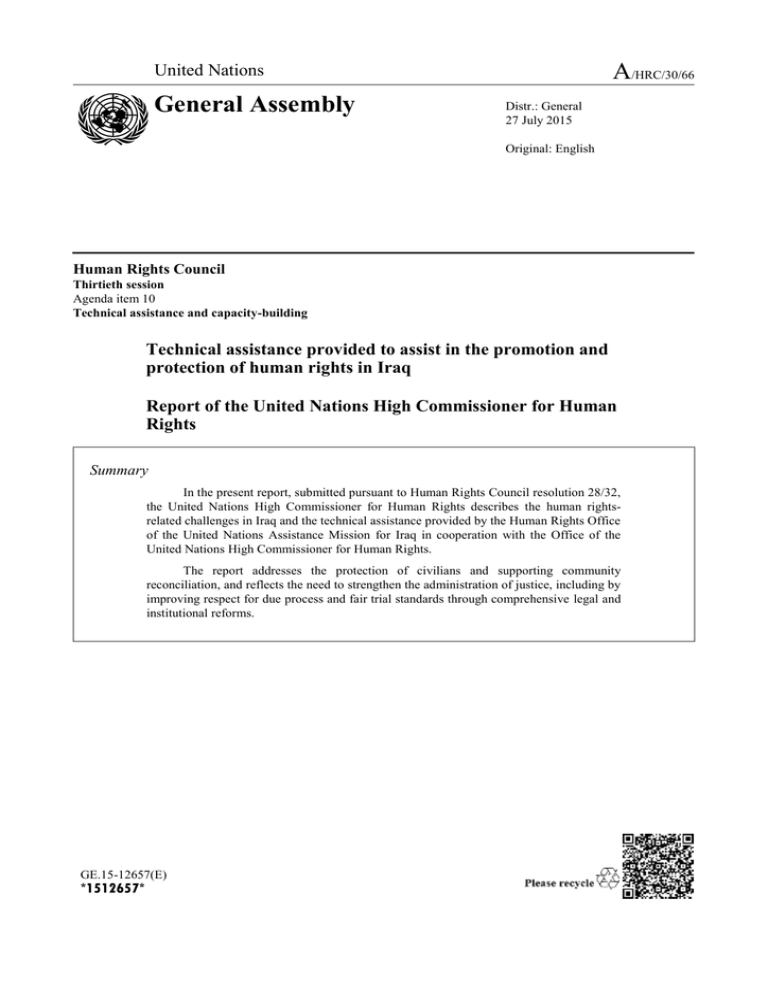
A/HRC/30/66 United Nations General Assembly Distr.: General 27 July 2015 Original: English Human Rights Council Thirtieth session Agenda item 10 Technical assistance and capacity-building Technical assistance provided to assist in the promotion and protection of human rights in Iraq Report of the United Nations High Commissioner for Human Rights Summary In the present report, submitted pursuant to Human Rights Council resolution 28/32, the United Nations High Commissioner for Human Rights describes the human rightsrelated challenges in Iraq and the technical assistance provided by the Human Rights Office of the United Nations Assistance Mission for Iraq in cooperation with the Office of the United Nations High Commissioner for Human Rights. The report addresses the protection of civilians and supporting community reconciliation, and reflects the need to strengthen the administration of justice, including by improving respect for due process and fair trial standards through comprehensive legal and institutional reforms. GE.15-12657(E) *1512657* A/HRC/30/66 Contents Page I. Introduction ...................................................................................................................................... 3 II. Background ...................................................................................................................................... 3 III. Human rights priorities and technical assistance needs ................................................................... 5 A. Protection of civilians .............................................................................................................. 5 B. Groups in focus ........................................................................................................................ 7 C. Administration of justice ......................................................................................................... 11 D. National institutions ................................................................................................................. 13 E. Legal reform ............................................................................................................................ 14 Conclusions ...................................................................................................................................... 16 IV. 2 A/HRC/30/66 I. Introduction 1. The present report, submitted pursuant to Human Rights Council resolution 28/32, was prepared in cooperation with the Human Rights Office of the United Nations Assistance Mission for Iraq (UNAMI). The Office of the United Nations High Commissioner for Human Rights (OHCHR) continues to assist UNAMI in implementing its mandate on the promotion and protection of human rights in Iraq. UNAMI is located in Baghdad and has field offices in Basra, Erbil and Kirkuk. Despite the difficult security situation, UNAMI continues to conduct its activities in governorates of Iraq in coordination with relevant governmental and non-governmental institutions. II. Background 2. The human rights situation in Iraq remains alarming in the light of violations and abuses committed by the so-called Islamic State in Iraq and the Levant (ISIL) and associated groups. The non-international armed conflict continues to affect large areas of the Anbar, Diyala, Kirkuk, Ninewa and Salah al-Din Governorates, while acts of violence and terrorism continue in Baghdad and other areas of the country. On 13 March 2015, OHCHR expressed its concern about the situation in Iraq in its report on the human rights situation in the light of abuses committed by the so-called Islamic State in Iraq and the Levant and associated groups.1 3. In March, Iraqi security forces and associated forces began military operations to retake Tikrit, Salah al-Din Governorate from ISIL, which had held the town since June 2014. Military operations commenced on 2 March with an assault by about 30,000 Iraqi security personnel, Popular Mobilization Units, armed groups and tribal fighters. Booby traps, roadside bombs and snipers impeded Iraqi and associated forces in taking the town. The offensive was halted on 14 March, ostensibly pending the arrival of reinforcements and to allow civilians to leave the city, but resumed on 27 March. Prime Minister Haidar alAbadi announced that the State had retaken control of Tikrit on 31 March. 4. On 13 April, ISIL attacked the country’s largest refinery, in Baiji, Salah al-Din Governorate, a strategically important facility accounting for more than a quarter of the State’s oil refining capacity. ISIL surrounded the refinery and set fire to three oil storage tanks. On 21 May, Iraqi security forces reportedly broke the siege by ISIL. Clashes continued, with ISIL targeting the Iraqi forces with suicide vehicle-borne improvised explosive devices. ISIL fighters reportedly set areas of the refinery on fire to hinder the advance of Iraqi forces. Gains by the Iraqi forces and the Popular Mobilization Units were announced, but reportedly suffered heavy casualties on 6 June after the detonation of one or more improvised explosive devices. On 9 June, ISIL reportedly advanced into the city in the wake of a number of suicide and mortar attacks. At the end of the period under review, heavy fighting around Baiji was continuing. 5. On 9 April, the Government of Iraq began military operations against ISIL in Anbar; the next day, ISIL launched an attack on Ramadi District on multiple fronts. On 9 May, the authorities began enlisting 1,000 new recruits to a Sunni militia to assist the Iraqi security forces in Anbar. By 16 May, the city had fallen to ISIL, which then began moving eastwards. Reportedly, some 3,000 Popular Mobilization Forces were deployed to the Habbaniyah airbase to fight ISIL, while 60,000 fighters were deployed to Baghdad to protect the city. 1 A/HRC/28/18. 3 A/HRC/30/66 6. After the fall of Ramadi, reports received contained allegations that ISIL had abducted and executed a significant number of civilians and captured Iraqi security personnel. There were also allegations that ISIL was preventing civilians from leaving the city. By 26 May, 220,164 people had fled Ramadi and its environs.2 Large numbers of internally displaced persons made their way towards Baghdad, Karbala and Babil Governorates, although many were denied entry unless they had a sponsor resident. 7. In late May, ISIL seized al-Walid border crossing between the Syrian Arab Republic and Iraq, launched an offensive to retake Anbar and carried out attacks east of Fallujah using vehicle-borne improvised explosive devices, killing at least 17 soldiers. 8. On 2 June, ISIL reportedly closed the gates of a dam in Ramadi, cutting water supplies to al-Khalidiya and al-Habbaniya to the east, which were held by Iraqi security forces and Popular Mobilization Units. Possibly as a result, the level of water in Thi-Qar Governorate dropped, in some places critically. On 4 June, several sheikhs and tribal leaders from Anbar reportedly pledged allegiance to ISIL after a meeting in Fallujah on 3 June. It is not clear whether support was pledged under duress. At the end of the period under review, clashes were continuing in several areas of Anbar. 9. The situation in Ramadi prompted the Kirkuk Provincial Council Security Committee to stop all road movement to and from areas controlled by ISIL on 20 May. On 25 May, the main Kirkuk-Baghdad road was reopened for part of the day. On 3 June, an explosion caused by an airstrike hit a storage facility, causing a significant number of casualties and damage to surrounding structures. Some reports indicated that the facility contained chemical fertilizers, while others claimed that it was used to build improvised explosive devices. One Council member informed media outlets that 150 civilians had been killed and wounded, including women and children, in addition to 100 ISIL militants. 10. During the period under review, Diyala Governorate witnessed a steady increase in attacks targeting members of its communities, culminating in May with 22 verified incidents, including at least 28 killings and 13 abductions. In most incidents, perpetrators remain unidentified. Explosions and attacks continued through June, with an individual detonating a vehicle-borne improvised explosive device at a security checkpoint in Baladruz on 6 June. The incident killed at least 11 civilians and wounded 14 others. 11. ISIL marked the one-year anniversary of the capture of Mosul, Ninewa Governorate. It continued to have control over all aspects of everyday life in the city. Dress codes have been imposed and freedom of movement is severely restricted. ISIL has imposed its own education curriculum, and demands steep rents and taxes. Punishment for violating ISIL rules is severe, often imposed by its self-appointed courts, and included flogging, amputation, beheading, stoning, immolation and other cruel and unlawful punishment. Reports have been received of a food scarcity in some areas under ISIL control in the Governorate. 12. In May, ISIL issued new instructions through mosques, pamphlets and its local radio channel ahead of the holy month of Ramadan. According to the instructions, women are not allowed to leave their home from dawn to sunset, and no stores, except grocery stores and pharmacies, may open during this period. On 17 May, ISIL divided Ninewa Governorate into three “states” – Jazeera, Tigris and Ninewa – and appointed a wali for each one. An order was also issued preventing residents from leaving Mosul, save for medical emergencies. In mid-June, local media reported that ISIL had banned grain exports from Mosul and was demanding a share of harvests from farmers. 2 4 International Organization for Migration (IOM) Displacement Tracking Matrix, Round XXI – May 2015. A/HRC/30/66 13. In Baghdad, terrorist attacks with improvised explosive devices were made on a daily basis, killing and wounding civilians. Unidentified bodies continued to be found around Baghdad and its outlying areas. 14. UNAMI/OHCHR continued to monitor and report on the human rights situation. UNAMI/OHCHR has repeatedly called upon all armed groups to comply strictly with applicable international humanitarian and human rights law and to take all feasible precautions to spare civilians the effects of hostilities. UNAMI and OHCHR issued joint reports on the protection of civilians in the armed conflict in Iraq on 18 August 2014, 3 26 September 20144 and 23 February 2015.5 They also issued joint reports on the death penalty in Iraq in October 2014,6 and on the judicial response to allegations of torture in February 2015.7 The ongoing hostilities and violence have, however, had a severe impact on the ability of UNAMI and OHCHR to verify furthermore allegations in areas under the control of ISIL or to provide technical assistance in those areas. III. Human rights priorities and technical assistance needs A. Protection of civilians 1. Impact of the conflict on civilians 15. From 1 January 2014 to 31 May 2015, UNAMI/OHCHR recorded at least 46,114 civilian casualties (15,612 killed and 30,502 wounded) as a result of the non-international armed conflict in Iraq.8 Owing to severe limitations to the capacity of UNAMI and OHCHR to verify reports of civilian casualties, these figures should be regarded as the minimum. Additionally, the number of civilians killed as a result of secondary effects of violence, such as lack of access to food, water or medicine, is unknown. 16. UNAMI/OHCHR supported the Government’s efforts to fulfil its primary responsibility to protect civilians from the effects of conflict and violence, and to meet its obligations under international human rights and humanitarian law. For instance, in May, it organized training courses for staff members of the National Operations Centre, composed of representatives of various government ministries, on State obligations in relation to international humanitarian law and human rights principles, including principles of proportionality and distinction, and reporting on incidents involving civilian casualties. 3 4 5 6 7 8 OHCHR/UNAMI, Report on the Protection of Civilians in the Non International Armed Conflict in Iraq: 5 June – 5 July 2014. OHCHR/UNAMI, Report on the Protection of Civilians in Armed Conflict in Iraq: 6 July – 10 September 2014. OHCHR/UNAMI, Report on the Protection of Civilians in Armed Conflict in Iraq: 11 September – 10 December 2014. OHCHR/UNAMI, Report on the Death Penalty in Iraq, Baghdad, October 2014. OHCHR/UNAMI, Report on the judicial response to allegations of torture in Iraq, Baghdad. February 2015. The civilian casualty figures given in the present report include civilians and civilian police officers, including civilian casualties from Anbar Governorate. UNAMI was prevented from effectively verifying casualties in conflict areas owing to the prevailing insecurity. The figures for casualties from Anbar Governorate, provided by the Anbar Health Directorate, might be underestimated owing to the heightened volatility of the situation and disruptions to services. In some cases, UNAMI was able to verify only partially certain incidents in the governorate. 5 A/HRC/30/66 17. UNAMI/OHCHR held a round table with Ninewa Provincial Council members in June to discuss the protection of civilians and the need for community reconciliation. The importance of accountability and justice for victims was emphasized as a means of overcoming the cycle of violence. 2. Unlawful killings and abductions 18. UNAMI/OHCHR continued to receive numerous credible reports of gross violations and abuses of human rights and serious violations of international humanitarian law being perpetrated by ISIL against civilians in an apparent widespread or systematic manner. In some instances, these may amount to war crimes, crimes against humanity, and genocide (see A/HRC/28/18). 19. In particular, ISIL continued to target individuals and groups, including former members of the Iraqi security forces, public figures, professionals and persons perceived to be associated with the Government or against ISIL ideology or rule. Sources reported that, on 9 June, ISIL killed 134 former members of the Iraqi security forces by shooting them in the head in Mosul, Ninewa. The victims had been held captive for months and forced to “repent” to ISIL, whose members suspected that they intended to join forces to liberate Mosul. Reports received described how ISIL also targeted and murdered religious and community leaders, as well as professionals, including journalists and doctors, who refused to conform to its rules or to work in its service. 20. ISIL carried out executions following sentences imposed its self-appointed courts, particularly in Mosul. Sources reported that residents were gathered and forced to watch executions and other cruel treatment. Often reasons for killings and abductions were unknown. 21. UNAMI/OHCHR also received reports of abuses and violations perpetrated by the Iraqi security forces and associated forces. In some cases, civilians and civilian infrastructure appear to have been directly targeted during military operations; in other cases, military operations may have been carried out without proper regard for the principles of distinction and proportionality. Reports indicated that some armed forces were operating outside of government control and perpetrating a range of violations and abuses, including unlawful killings, abductions and destruction of property in areas recently liberated from ISIL. 22. UNAMI/OHCHR also received reports of targeted attacks and reprisals against persons believed to support or to be associated with ISIL, particularly Sunni Arab community members. In early June, a video was posted on the Internet purporting to show members of a militia burning the body of a man hanging by his feet, reportedly in Garma, north-east of Fallujah, Anbar Governorate. Members of the militia are heard accusing the man of having been a member of ISIL. 23. UNAMI/OHCHR documented human rights abuses and violations committed by unidentified perpetrators. Detonation of improvised explosive devices in public places, unlawful killings and abductions continued to be reported in large numbers, particularly in Baghdad, as well as in other areas of the country not directly affected by the armed conflict. Targeted individuals included parliamentarians, tribal and religious leaders, judges and other public officials. 3. Destruction of civilian property and infrastructure 24. ISIL continued deliberately to target civilian objects in attacks, in particular the property of individuals perceived to oppose ISIL, including the homes of tribal leaders, public officials and local leaders, as well as government buildings. UNAMI/OHCHR also 6 A/HRC/30/66 verified reports that ISIL had planted explosives in homes when retreating from territory, killing civilians when they returned. 25. ISIL also continued to destroy places of religious and cultural significance, which ISIL considers to be un-Islamic, including mosques, churches, ancient sites, shrines, tombs and graves. ISIL loots the sites before destroying them. 26. UNAMI/OHCHR also received allegations that pro-government forces had destroyed civilian property. On 1 April, UNAMI received reports that militias had looted and burned more than 200 civilian homes and 300 shops in Tikrit, Salah al-Din Governorate in the first 48 hours of the liberation of the city. The Prime Minister established a committee to investigate the events. The committee issued a statement noting that 67 homes and 85 shops were burned down in Tikrit at the beginning of April. UNAMI met with tribal and community representatives from Tikrit to discuss these reports, as well as the alleged targeting of civilians by militia forces. The means of creating conditions for the safe, dignified and voluntary return of displaced persons to their homes were also discussed. B. 1. Groups in focus Women 27. The 2005 Constitution provides for fundamental women’s rights, including equal treatment before the law. UNAMI/OHCHR nonetheless observed that Iraqi women continued to face violence, discrimination and unequal treatment. Cases of domestic violence are believed to go largely unreported and unpunished, and victims remain largely unprotected. The lack of comprehensive official statistics on domestic violence prevents a full understanding and the formulation of a proper response to such cases. 28. Strengthening the legal protection framework against gender-based violence continues to be a priority. The draft family protection law, the text of which substantively fails to meet the State’s obligations under international law, has been pending before the Council of Representatives. The draft shelter policy for victims of domestic violence also remained under review. The Criminal Code No. 111 of 1969 continues to permit “honour” as a lawful defence in crimes alleging violence against women and family members, although it is reported that many hundreds of women die from honour killings each year. UNAMI/OHCHR also received credible reports of women being trafficked inside Iraq. Women remain underrepresented in public life. 29. The family protection units of the Iraqi police, aimed at providing protection to victims of domestic violence, are underresourced and understaffed, and remain inaccessible to most victims; consequently, women who are the victims of domestic and other forms of gender-based violence still have nowhere to seek sanctuary or to claim their legal rights. Those who seek protection are often housed in women’s prisons and detention centres. 30. In the Kurdistan region of Iraq, the full realization of women’s rights continues to be hindered by a number of factors, including deep-rooted patriarchal norms, legislative gaps and a culture of silence. The participation of women in political life remains limited. The Government of the Kurdistan region of Iraq has, however, introduced a number of legislative, institutional and policy reforms aimed at addressing violence against women and other forms of discrimination. 31. The ability of women to enjoy a full range of human rights has deteriorated considerably with the ongoing armed conflict. ISIL, in particular, continues to perpetrate gross violations of women’s rights. It has imposed strict codes of behaviour, including 7 A/HRC/30/66 regulations concerning dress and freedom of movement. Women must be fully covered while in public and are only allowed to move in public in the company of an appropriately related male chaperone. Severe forms of punishment are imposed for non-compliance, including fines, lashings and even execution. 32. ISIL continued to target female community and political leaders, subjecting them to abduction, torture and murder. UNAMI/OHCHR continued to receive reports that women and girls held by ISIL, particularly those from ethnic and religious minority communities such as the Yezidi and others, are subjected to harrowing acts of sexual and physical violence and to sexual slavery. UNAMI/OHCHR believes that there may still be as many as 3,500 women and children, and some men, predominantly Yezidi, but also other ethnic and religious communities who are still being held by ISIL. Sexual violence appears to be used by ISIL as a deliberate tactic in targeting diverse ethnic and religious communities. 33. UNAMI/OHCHR works with a range of counterparts, including government actors, institutions, civil society groups and women’s right defenders to monitor women’s rights to raise awareness and build capacity of local actors. For instance, in the Kurdistan region of Iraq, UNAMI is working with the Directorate for Combating Violence against Women to promote respect for key human rights standards and to raise awareness about violations against women. 34. In mid-May, UNAMI/OHCHR met with a member of the Board of Commissioners of the Iraq High Commission for Human Rights to discuss concerns regarding allegations of violations and abuse of internally displaced persons perpetrated by security forces, including alleged sexual violence. On 2 June, UNAMI/OHCHR also met with the Chairperson of the Committee on Women of the Basra Provincial Council to discuss the protection of civilians and the vulnerability of women and girls during armed conflict. It provided technical advice on the responsibility of State actors and actions to be taken to ensure the protection of women and girls. 35. UNAMI/OHCHR will also seek to implement, inter alia, a number of projects to strengthen the Iraqi legal system and institutions, in particular to address sexual and genderbased violence and to promote gender equality in compliance with international human rights law; to further increase participation of human rights defenders and journalists, including women, in public life at the international, national and local levels; and to increase access to psychosocial support for victims of torture and sexual and gender-based violence. 2. Children 36. Children have been the victims of violence associated with the hostilities and been severely affected by the denial of access to humanitarian assistance and the disruption to education caused by the ongoing conflict. UNAMI/OHCHR also continued to receive reports of forced recruitment and use of children in hostilities by ISIL. 37. The ISIL recruiting campaign continued, with reports in mid-May that ISIL fighters were visiting high schools in Mosul and demanding that students as young as 14 pledge allegiance to the group and to fight in its forces. ISIL subsequently announced at schools and universities that all male students must join ISIL after completing their exams. ISIL posted videos on the Internet purporting to show children being taught its ideology and trained to become fighters. The children in the videos appeared to be as young as 12. Another video appeared to show captured Yezidi children as young as seven being indoctrinated. UNAMI/OHCHR received reports that ISIL has used children as fighters in areas of Sinjar and Zummar in Ninewa Governorate. 8 A/HRC/30/66 38. UNAMI/OHCHR works with the United Nations Children’s Fund to monitor and report on violations of the rights of children, contributing to the annual report of the Secretary-General on children and armed conflict, and reporting on relevant violations to the Security Council by way of a global horizontal note coordinated by the Special Representative of the Secretary-General for Children and Armed Conflict. 3. Internally displaced persons 39. The non-international armed conflict in Iraq resulted in the internal displacement of 3,035,592 civilians from January 2014 to 21 May 2015. Over 70 per cent are from Anbar and Ninewa Governorates. As at 21 May, improvements in the security situation in some areas led to the return of 171,204 displaced persons to their places of origin.9 40. UNAMI/OHCHR monitors the situation of internally displaced persons across Iraq and – security conditions permitting – conducts regular visits to camps and other locations where displaced persons have settled. UNAMI liaises with authorities and organizations providing support to displaced persons and raises issues of concern during monitoring visits. UNAMI/OHCHR gave capacity-building assistance to staff providing front-line support to displaced persons. For instance, in early June, UNAMI/OHCHR gave training courses on international human rights standards, with a particular focus on the rights of internally displaced persons, humanitarian principles, and the protection of civilians in conflict, to 45 staff members from four camps for displaced persons in Dohuk Governorate. UNAMI/OHCHR, as a full member of the United Nations country team Protection Cluster, also supports work to address the needs of displaced persons. 41. In southern Iraq, where thousands of displaced families have been hosted in camps and collective centres since June 2014, UNAMI/OHCHR and United Nations country team staff members met with officials from the Ministry of Displacement and Migration in Basra in mid-June. Methods of improving coordination among country team agencies and nongovernmental organizations regarding the protection of civilians were discussed, and UNAMI/OHCHR gave a briefing on international humanitarian law, including on international crimes. 42. UNAMI/OHCHR has consistently advocated for the full respect of the rights of internally displaced persons, particularly their freedom of movement and access to safety and humanitarian assistance. UNAMI/OHCHR regularly liaises with local government actors, including mayors and governors, concerning the rights of displaced persons, and advocates for appropriate measures to ensure their freedom of movement and access to safety while taking security concerns into account. For instance, UNAMI/OHCHR met with a member of the Kirkuk Provincial Council, city council members and several village and community representatives in Kirkuk to discuss authorization procedures for return to liberated areas, the security concerns of displaced persons, the destruction of property, the appropriation of land and access to humanitarian assistance. 43. On 26 May, UNAMI/OHCHR met with members of the Iraqi police in Kirkuk to discuss the situation of internally displaced persons in the city, including access through checkpoints and registration procedures, as well as reports of arrests of displaced persons in certain areas of the city. UNAMI/OHCHR raised concerns regarding the voluntary nature and safety of the prospective return of displaced persons to areas of origin, as well as protection concerns of women and girls, including early marriage, increased prostitution, and the rising number of street children, who are particularly vulnerable to sexual exploitation. UNAMI/OHCHR also met with the Intelligence Police (Asayish) of the 9 IOM, Displacement Tracking Matrix (see footnote 2). 9 A/HRC/30/66 Kurdistan region of Iraq in Kirkuk to discuss the security of displaced persons in the city and to raise the issue of alleged forced returns. 44. UNAMI/OHCHR continuously engages with the Ministry of Human Rights and has developed an agreed timetable for the delivery of joint technical assistance, including training courses on human rights and humanitarian law. 45. In early May, UNAMI/OHCHR met with the Minister for Human Rights to discuss allegations that displaced persons from Anbar seeking refuge and protection in Baghdad had been subjected to threats, kidnapping and killings by armed groups. Reports were also received that displaced persons had been forcibly evicted from Baghdad and sent back to Anbar. The Government was urged to investigate these reports and to respect fully the rights of displaced persons to have access to areas of safety. 46. UNAMI monitored cases of arrest and detention of internally displaced persons attempting to reach areas of safety. Reports indicated that many, if not most, of these detainees had been held by authorities without charge for long periods without access to judicial review or legal representation, and their families had not been informed of their whereabouts. UNAMI regularly monitors detention facilities to follow up on such cases and has advocated with security forces and Government authorities to ensure that international due process standards are respected. 4. Ethnic and religious groups 47. Ethnic and religious groups and minorities in Iraq have endured a history of discrimination and violence. These communities have become more vulnerable owing to the ongoing armed conflict and many have suffered gross violations of their human rights. 48. ISIL has continued to target members of different ethnic and religious communities, including Christians, Faili Kurds, Kaka’e, Sabaeans, Shabak, Shi’a Arabs, Turkmen, Yezidi and others, intentionally subjecting them to a range of abuses and violations of international human rights and humanitarian law. These acts appear to be part of a systematic or widespread policy that aims to suppress, permanently expel or destroy these communities within ISIL areas of control. ISIL continued to publish “justifications”, including its requirement to cleanse lands under the control of its self-declared “Islamic caliphate” of “infidels”, by forcibly converting, suppressing, expelling or killing people of other faiths or those who do not subscribe to its takfiri doctrines. ISIL has imposed on Christians and Sabaeans the requirement to convert to Islam, pay jezyah (a protection or toleration tax), be expelled or be killed; for Shias to repent or face penalties (including death) as apostates; and for Yezidi, Kaka’ee and other faith communities (which ISIL regard as infidels) to convert to Islam or be killed. Most recently, ISIL published another “justification” for the sexual enslavement of Yezidi women and other women from communities it regards as kufaar (infidels) in its magazine, Dabiq. 49. As many as 2,500 men, women and children – predominantly from the Yezidi community but also from other groups – are being held by ISIL. UNAMI/OHCHR fears for their safety and security. Those who have reached safety consistently report lack of basic necessities such as food and hygienic items, forced labour, forced religious conversion, illtreatment, murder and the regular infliction of physical and sexual violence, including sexual slavery and the trafficking of women and children. 50. UNAMI/OHCHR has been monitoring the situation of minority groups in Iraq, and actively working with local communities to promote respect and protection of their rights. UNAMI met with the elected representative of minority communities in the Basra Provincial Council and legislative staff to give advice and make recommendations on 10 A/HRC/30/66 international standards regarding the protection of civilians, particularly vulnerable ethnic and religious minorities. 51. In June 2015, UNAMI/OHCHR re-established a committee appointed by a conference on the rights of minorities held in Baghdad in March 2014 and attended by representatives of all minority ethnic and religious communities in Iraq. The participants had agreed to a declaration on the rights of minorities in Iraq and a road map of legislative, policy and other reforms that would strengthen their protection and facilitate their full and equal participation in political, social and economic life. The security situation had prevented the committee from convening any meetings until recently. 52. In the Kurdistan region of Iraq, UNAMI/OHCHR offered technical assistance to members of Parliament regarding draft legislation to establish a minorities council with a mandate to protect and promote the rights of minorities in the region. UNAMI/OHCHR made comments on the draft law, advising that the role of the council be made meaningful through elaboration of its mandate and that the issues of its independence and authority of be clarified. 5. Persons with disabilities 53. Across Iraq, UNAMI/OHCHR observed that persons with disabilities were often neglected in public discourse dominated by the ongoing armed conflict. They remain among the most vulnerable communities, and face numerous barriers to their full and equal participation in political, social, economic and cultural life. The full impact of the conflict on this group is unknown and the welfare of those living in areas under ISIL control or where conflict is ongoing remains a grave concern. 54. UNAMI has been working with members of the Government and with civil society to improve the enjoyment of rights by persons with disabilities. For instance, it delivered a training workshop on 26 May in coordination with a local non-governmental organization representing people with disabilities. Approximately 20 people with disabilities attended the workshop, together with government officials working on disability-related issues. The participants were trained on methodologies for improving advocacy to promote greater respect for their rights through an increased understanding of the legal regime of protection of persons with disabilities. C. 1. Administration of justice Judicial system and respect for due process 55. UNAMI/OHCHR continued to work with relevant government and judicial departments to address shortcomings in the application of due process and fair trial standards. Particular attention is given to respect for procedural guarantees, including the presumption of innocence, access to legal counsel, and consideration of the testimony of witnesses and other evidence provided as opposed to confessions that might have been extracted under duress. 56. UNAMI/OHCHR assists the Government in implementing law, policy and institutional reforms aimed to bring about greater respect for the rule of law, including due process and fair trial standards. 57. In May, UNAMI/OHCHR gave technical assistance to 30 lawyers from Anbar, Baghdad, Diyala and the Kurdistan region of Iraq on the Basic Principles on the Role of Lawyers, human rights standards in the administration of justice, and the legal framework for the protection of internally displaced persons. UNAMI/OHCHR continues to provide 11 A/HRC/30/66 capacity-building assistance to justice actors to strengthen the rule of law and respect for due process, and in this regard will implement a project to facilitate consultations with stakeholders and develop human rights and rule of law training curricula for civilian law enforcement and corrective services officials. 58. UNAMI/OHCHR also brought allegations of enforced disappearance to the attention of the Government. Multiple reports were received that individuals had been detained by Iraqi and Kurdish authorities, but their whereabouts had not been communicated to their families, detainees had not been informed of the charges against them, they had been denied access to legal representatives or were being held incommunicado. UNAMI/OHCHR engaged with the Minister of the Interior, the Minister for Defence, the Minister for Human Rights and the Minister for Justice to ascertain whether disappeared individuals had been detained by any Iraqi authorities and, if so, requested that they provide information on the whereabouts and condition of specified individuals, as well as on the status of any legal proceedings against them. In June 2015 the Government of Iraq responded to the queries of the Committee on Enforced Disappearances in relation to three cases. 2. Detention standards 59. According to the Government, as at 14 April 2014, 27,843 persons were being held in detention centres and prisons administered by the Ministry of Justice. This number included 11,779 detained under the Anti-terrorism Law (both those awaiting trial and those convicted), 926 women and 181 juveniles. 10 60. Where security conditions allow, UNAMI/OHCHR regularly visits detention centres and prisons under the authority of the Ministry of Justice. Although conditions of detention have improved, problems persist, including overcrowding, poor hygienic conditions and limited medical services in some facilities. UNAMI/OHCHR also noted a lack of specialized facilities to accommodate women and children, who are often held in cells in police stations. Children are often interned in adult facilities. 61. Through its monitoring, UNAMI/OHCHR notified the authorities responsible for detention facilities and the Ministry of Justice of issues of concern and cases requiring attention. It also made recommendations on improving conditions of detention to bring them into line with international standards. Owing to the security situation in the country and the transfer of prisoners and detainees to safe areas, detention centres and prisons have suffered serious overcrowding in already inadequate penitentiary infrastructure. 62. For instance, in early April, UNAMI/OHCHR visited the Basra Central Prison, where many individuals held for terrorism-related offences are detained. UNAMI met with the director to discuss compliance with due process standards, particularly the right of detainees to have access to a lawyer while in detention and facilitation of the right of the accused to prepare an adequate defence. The duties of prison officials and procedures that should be in place when faced with credible allegations of torture were also discussed. The director pointed out that, owing to transfers of detainees from other parts of Iraq, the facility hosted twice as many detainees than its maximum capacity. Similarly, the director of alHoot prison in Nassiyira pointed out the same problem in his facility. 63. Overcrowding was exacerbated by the lack of adequate resources for the judiciary to process cases in a timely and efficient manner. 10 12 The figures include detainees held in two federal prisons in the Kurdistan region of Iraq. The number of detainees held under the authority of the ministries of the Interior, Defence and Labour and Social Affairs is not known. A/HRC/30/66 64. On 14 April, UNAMI/OHCHR visited al-Rusafa detention facility in Baghdad and subsequently sent recommendations to the Ministry of Justice on improving the conditions of detention. In June, UNAMI/OHCHR visited several detention facilities in Zakho, Dohuk Governorate, and raised concerns with relevant authorities regarding the conditions of detention at an Asayish facility. 65. In late April, in coordination with the management of al-Ma’aqal Prison in Basra, UNAMI/OHCHR held a seminar where experts from the University of Basra delivered presentations on prison management, treatment of detainees, and their reintegration into society. The experts discussed, inter alia, international legal standards applicable to persons deprived of their liberty and comparative best practices in prison management that could be adopted in Iraq. The participants included judges, prosecutors, prison officials, lawyers, journalists and representatives of non-governmental organizations. 3. Torture and other ill-treatment 66. UNAMI/OHCHR received allegations from detainees and prisoners that they had been subjected to torture and other ill-treatment. Through direct trial monitoring, UNAMI/OHCHR noted that courts often relied on confessions as the sole or most significant evidence upon which convictions are based, even where the accused person has claimed that the confession was induced through torture. 67. UNAMI/OHCHR has advocated to the Government to ensure that any allegations of torture or other ill-treatment are promptly and properly investigated. D. 1. National institutions National Human Rights Commissions 68. UNAMI/OHCHR began to advocate for the establishment of an Iraqi High Commission for Human Rights in compliance with the Paris Principles in 2004. The Commission was established by law No. 53 of 2008. 69. UNAMI/OHCHR, in partnership with the United Nations Office for Project Services and the United Nations Development Programme (UNDP), in a project funded by the European Union, provided the Iraqi High Commission for Human Rights with support and technical advice. In May, UNAMI/OHCHR gave training courses to members of the Commission secretariat on the protection of civilians, State responsibility, accountability mechanisms and the role of the national human rights institution. In June, a training course was conducted on monitoring, investigating and reporting on human rights violations and abuses to more than 40 staff members of the Commission secretariat. 70. UNAMI/OHCHR, in partnership with UNDP, also supported the establishment and capacity-building of the Independent Board of Human Rights in the Kurdistan region of Iraq. UNAMI/OHCHR supported the creation of a database to facilitate informationgathering and analysis, and organized training courses on detention monitoring and the investigation and documentation of human rights violations. 71. On 3 November 2014, Iraq was reviewed for the second time by the Working Group on the Universal Periodic Review. A total of 91 States made 229 recommendations on improving the human rights situation, of which the Government accepted 175. UNAMI/OHCHR provided the Government with technical assistance in the preparation of its State report, and also trained members of non-governmental organizations to assist in with the preparation of their stakeholder submissions. UNAMI/OHCHR furthermore provided technical support to a coalition of 29 representatives of non-governmental 13 A/HRC/30/66 organizations from all governorates of Iraq in preparation of their submission to the review. It also gave technical advice to Iraqi High Commission for Human Rights and the Independent Board of Human Rights on their joint submission, and assisted the United Nations country team in preparing its submission. UNAMI/OHCHR is working with the Government on the development of a second national plan of action on human rights to implement the recommendations accepted during the review. 2. Civil society actors 72. UNAMI/OHCHR regularly liaises with civil society partners, human rights defenders and journalists. In mid-June, UNAMI/OHCHR organized capacity-building activities on human rights-based approaches to journalism for 18 journalists in Kirkuk. The activity sensitized participants on special considerations to take into account when reporting on human rights issues. 73. On 24 May, UNAMI/OHCHR met with the Chairperson of the non-governmental organization committee of the Basra Provincial Council and discussed how the ongoing armed conflict has been affecting the work of non-governmental organizations in the governorate. UNAMI provided advice on best practices for civil society organizations to work on protection of civilians and explored means of enhancing cooperation among the Council, non-governmental organizations and UNAMI/OHCHR. 74. Nineteen staff members of a Yezidi non-governmental organization were trained in June in Dohuk Governorate on human rights, humanitarian and protection principles, and monitoring and documenting violations. In addition, UNAMI/OHCHR provided technical assistance to non-governmental organizations in Basra on human rights standards, including the responsibility of State actors in relation to the protection and human rights of civilians. E. 1. Legal reform Transitional justice 75. UNAMI/OHCHR has been pursuing initiatives to promote community reconciliation. For instance, UNAMI/OHCHR engaged with Government actors in the deBaathification process. It also offered technical advice on legislation to amend the current justice and accountability law, which mandates the investigation of individuals referred to it and different actions addressing individuals found to have been members of the Baath party. 76. UNAMI/OHCHR also embarked on a community reconciliation programme, which involves working in partnership with Iraqi non-governmental organizations to identify past human rights violations, and individuals and communities that have been affected by them, and to engage in a dialogue on processes and policies that would provide victims with justice, accountability and compensation or support. 2. Criminal laws 77. In the context of the ongoing gross violations of human rights and serious violations of humanitarian law in Iraq, such as those committed by ISIL and associated armed groups, UNAMI/OHCHR has encouraged the authorities to pursue meaningful accountability, particularly for international crimes. At present, war crimes, crimes against humanity and genocide are not within the jurisdiction of the domestic courts. In the Kurdistan region of Iraq, UNAMI/OHCHR met with the Deputy Speaker and the Human Rights Committee of the Parliament to advocate for the inclusion of these crimes in regional legislation so that 14 A/HRC/30/66 perpetrators could be brought to justice in a manner that recognizes the true nature of such crimes. UNAMI/OHCHR also encouraged the Government of Iraq to accede to the Rome Statute of the International Criminal Court and to ratify Protocol to the Geneva Conventions relating to the Protection of Victims of Non-International Armed Conflicts. UNAMI/OHCHR conducted training with the Parliamentary Human Rights Committee on the protection of civilians and on international legal obligations with regard to accountability for the commission of international crimes. 3. Anti-terrorism laws 78. UNAMI/OHCHR has serious concerns concerning Anti-terrorism Law No. 13 of 2005 and its conformity with international human rights standards. UNAMI/OHCHR conducted advocacy with the Government of Iraq, the Parliamentary Human Rights Committee, law enforcement officials, the judiciary and non-governmental organizations on the need to amend the law to ensure it complies with international human rights standards. UNAMI/OHCHR has embarked on a technical cooperation project to study thoroughly the law and to propose amendments. 79. UNAMI/OHCHR will implement a number of projects involving consultations with stakeholders with a view to identifying gaps in the criminal system and drafting a comprehensive package of proposed law reforms, and to developing and advocating for a package of policies and approaches that will ensure respect and protection of human rights while countering terrorism. 80. UNAMI/OHCHR also has concerns regarding the anti-terrorism law of the Kurdistan region of Iraq and its lack of conformity with international human rights standards.11 81. UNAMI/OHCHR extensively engaged with the authorities in the Kurdistan region of Iraq on the law, and urged that it be brought into conformity with international human rights standards. UNAMI also met with al-Shura Council and the Human Rights Committee of the Kurdistan Parliament to reiterate this position. 4. Death penalty 82. The Government of Iraq continues to implement the death penalty despite repeated calls, including those of the Secretary-General and the United Nations High Commissioner for Human Rights, to implement a moratorium on the death penalty with a view to its abolition, in accordance with relevant resolutions of the General Assembly. 83. While officially no executions have been carried out in Iraq in 2015, UNAMI/OHCHR received reports that four individuals were executed in March in al-Hoot prison in Nassiriyah. UNAMI/OHCHR informed the Government that lack of transparency in the application of the death penalty constitutes a violation of the State’s international legal obligations with regard to due process and transparency. 84. UNAMI/OHCHR also intervened with several government officials with regard to a number of cases where individuals (including two foreign nationals) were sentenced to death for crimes allegedly committed while juveniles, urging their execution be immediately stayed and their ages be properly determined, whereupon the verdicts should be set aside and the individuals in question be retried in accordance with standards applicable to juveniles. 11 For instance, see Human Rights (CCPR/C/82/D/1110/2002), para. 5.2. Committee, communication No. 1110/2002 15 A/HRC/30/66 85. The Kurdistan Regional Government continues to apply an unofficial moratorium to the death penalty. No executions have taken place in 2015. UNAMI continues to encourage Kurdish authorities to formalize the moratorium by abolishing the death penalty in law. IV. Conclusions 86. The human rights situation in Iraq remains alarming in the light of violations and abuses committed by ISIL and associated groups. The non-international armed conflict and acts of terrorism continue to inflict tremendous suffering on civilians. ISIL continued to target members of different ethnic and religious communities, intentionally subjecting them to a range of abuses and violations of international human rights and humanitarian law. 87. The ability of women to enjoy the full range of human rights has deteriorated considerably with the ongoing armed conflict. Children suffer from violence and trauma, and bear the brunt of displacement. From 1 January 2014 to 31 May 2015, UNAMI/OHCHR recorded at least 15,612 civilians killed, 30,502 others wounded and at least 3 million persons displaced as a result of the non-international armed conflict in Iraq. 88. UNAMI/ OHCHR continued to monitor and report on the human rights situation and repeatedly called upon all armed groups to comply strictly with applicable international humanitarian and human rights law, and to take all feasible precautions to spare civilians from the effects of hostilities. UNAMI/OHCHR issued joint reports on the human rights situation in Iraq and provided technical support to duty bearers and stakeholders in addressing protection concerns. 89. UNAMI/OHCHR continued to provide training and capacity development to relevant ministries and parliamentary committees, the Iraqi High Commission for Human Rights and various civil society actors. 90. In response to the current crisis and its effects, UNAMI/OHCHR dedicated considerable efforts to promoting and protecting human rights and the rule of law through a three-fold project. UNAMI/OHCHR will develop studies of legislation and policies with a view to submitting proposals on judicial, legal and institutional reforms to the relevant authorities. 91. UNAMI/OHCHR will assist the Government of Iraq in comprehensively reviewing criminal justice laws and policies, including Anti-terrorism Law No. 13 of 2005, to ensure compliance with international human rights standards, including with regard to the rights of due process and fair trial standards, and to introduce amendments to the Criminal Code and other relevant laws to grant domestic courts jurisdiction over international crimes committed in Iraq. 92. UNAMI/OHCHR will advise the Government in undertaking administrative and institutional reforms to ensure that the police forces and all officials engaged in law enforcement and the administration of justice comply with the obligations of Iraq under its Constitution and under international human rights law, including with regard to persons detained in relation to terrorism. 93. In addition, strengthening the legal framework for the protection against gender-based violence continues to be a priority. UNAMI/OHCHR will assist the Government in addressing legal gaps in the protection of women, in compliance with international human rights law, and, in particular, in ensuring that the national strategy on combating violence against women is fully implemented. 16 A/HRC/30/66 94. UNAMI/OHCHR will design human rights training manuals tailored to government officials and civil society actors, and conduct a series of human rights training courses for them. 95. UNAMI/OHCHR will also organize a forum to discuss best practices regarding legal and institutional reforms, in particular on the use of the death penalty in Iraq. 17
